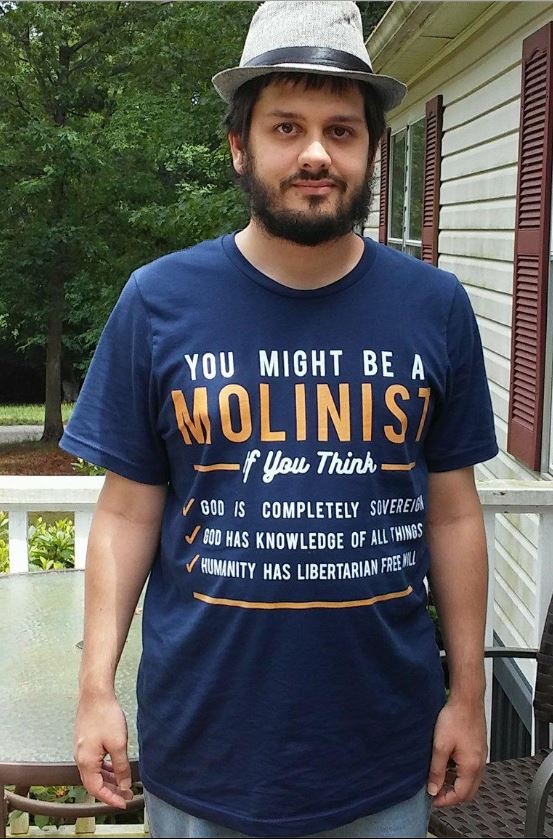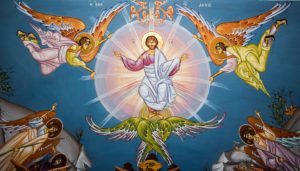So, my friend Chan Arnett sent me one of the novelty T-shirts that he’s been selling on Amazon.com. The theme of these T-shirts is Molinism and he’s been advertising them in the Facebook Group “Molinism – Official Page” You can get yourself an awesome Molinist shirt for a reasonable price of 20 bucks if you go over to Amazon.com. So far, he’s got at least 2 different kinds, but I think he plans on creating and producing more. Quite frankly, I’d like to have a T-shirt with Luis De Molina’s picture on it that says “Luis De Molina Is My Homeboy”, you know, to counter those “Jonathan Edwards/John Calvin Is My Homeboy” t-shirts. Maybe he’ll make one at some point.
The shirt that I’m wearing came from here. You can click the word “here” which should be highlighted purple and it will take you to the place where you can order one for yourself. It comes in 5 different colors: Black, Navy Blue, Brown, and Heather Blue. As you can see, the one I’m wearing in the photo above is Navy Blue.
A second shirt you can buy says “Molinists: Falsely Accused Of Being Heretics Since 1588” It comes in 3 different colors: Black, Navy Blue, and Dark Heather.
If you’re a Molinist and you like Novelty T-shirts, please go support Chan Arnett and buy one of his T-shirts. Buy two of them. Heck, buy one for every member of your congregation! Because this won’t only help to spread the word about one of the most fruitful and simultaneously least understood theological system in the history of systematic theology, but it will also help Mr. Arnett raise money to help him get through school.
By the way, these t-shirts are very high quality. They’re made of strong fabric and the printing is professionally done. These shirts were built to last.
What Is Molinism?
If you’re not a Molinist, you either may have heard of it but has a distorted view of it, or you may never have heard of it at all. Most people who sit in the pews on Sunday fall into the latter category. Those in theological circles mostly fall into the former category, save for the people who actually adhere to the system.
*Luis De Molina and Why He Formulated His System
Molinism is the brainchild of Luis De Molina who lived from 1535 to 1600. He was a Jesuit Priest and a counter reformer. That fact alone turns a lot of people off, because, after all, who wants to listen to a stinkin’ Jesuit who opposed the reformation? Don’t do that. If you do, you’ll commit the genetic fallacy. Whatever else Molina may have been wrong about, there’s nothing specifically Catholic about the system that bears his name, and Molinism could be true or false regardless of who thought of it. Molina founded his doctrine of a middle-knowledge-style-divine-providence because he wrestled with tensions in scripture that seemed hard to reconcile. Molina felt that theologians had typically pitted these theological truths against each other.
 For example, The Bible seems to teach that God is sovereign and controls all things down to the tiniest detail. Proverbs 16:33 says “The Lot is cast, but it’s every decision is from The Lord”. When you throw dice or lots, whatever result comes up is by the hand of God. So when you lose at Dungeons and Dragons, just blame God (kidding of course). But that is an example of a very small thing that God controls. Every decision from cast lots is from The Lord. In Proverbs 16:9, we read “In their hearts humans plan their course, but The Lord establishes their steps.” This verse says that the steps of men are established by God’s hand. We can plan where we go, but ultimately, where we go is where God makes us go. Proverbs 20:4 says “Man’s steps are ordained by The Lord, how then, can man understand His way?” In Proverbs 21:1, we read “In the LORD’s hand the king’s heart is a stream of water that he channels toward all who please him.”
For example, The Bible seems to teach that God is sovereign and controls all things down to the tiniest detail. Proverbs 16:33 says “The Lot is cast, but it’s every decision is from The Lord”. When you throw dice or lots, whatever result comes up is by the hand of God. So when you lose at Dungeons and Dragons, just blame God (kidding of course). But that is an example of a very small thing that God controls. Every decision from cast lots is from The Lord. In Proverbs 16:9, we read “In their hearts humans plan their course, but The Lord establishes their steps.” This verse says that the steps of men are established by God’s hand. We can plan where we go, but ultimately, where we go is where God makes us go. Proverbs 20:4 says “Man’s steps are ordained by The Lord, how then, can man understand His way?” In Proverbs 21:1, we read “In the LORD’s hand the king’s heart is a stream of water that he channels toward all who please him.”
The above verses are but a small sampling of texts that appear to say that everything is controlled by God. Now, Calvinists will use these verses to support a view called Universal Divine Determinism. This view states that everything that happens is causally determined by God. Every thought, emotion, action, and deed of every man is determined to occur by God. On this view, there is no free will.
The problem is that there’s good biblical support for libertarian free will as well! For example, in 1 Corinthians 10:13, the apostle Paul wrote: “No temptation has overtaken you, except what is common to man. And God is faithful. He will not allow you to be tempted beyond your ability, but with the temptation, will provide a way of escape also so that you will be able to endure it.” This is probably the most powerful evidence of libertarian free will, the most explicit example of libertarian free will in the entire Bible. Paul says that the temptation that afflicts his readers isn’t anything unusual, nothing unique to them. He then goes on to say that God is faithful, and won’t allow the temptation to sin to be so overwhelming that it’s impossible for them to resist it. Instead, God will provide “a way of escape” so that they’ll endure it and ergo avoid sinning.
Paul is assuming here that his readers don’t have to sin. Sin is not inevitable. God provides a way out so that we’ll be able to avoid sin. If we do sin, it’s because we refused to take “the way of escape” that God offered. If we don’t sin, it’s because we chose “the way of escape”. This verse presupposes libertarian free will. It presupposes that the listener does not have to sin. He’s faced with A (sin) and Non-A (The Way Of Escape). He can choose either and is responsible for whichever one he chooses. The determinist cannot make sense of this verse. If humans are causally determined to do everything we do, then “the way of escape” was not a possible option for those who sin. “The way of escape” on determinism, was nothing but an illusion! Only if man truly has the power to genuinely choose between alternatives, can we say that “the way of escape” was a possible option for those who sinned.
Paul is essentially saying in 1 Corinthians 10:13 “Look, you don’t have to sin. You don’t have to. God will provide a way out so you’ll be able to endure it. If you choose not to take His way out, it’s your fault, not God’s.”
“See, I set before you today life and prosperity, death and destruction. For I command you today to love the Lord your God, to walk in obedience to him, and to keep his commands, decrees and laws; then you will live and increase, and the Lord your God will bless you in the land you are entering to possess. But if your heart turns away and you are not obedient, and if you are drawn away to bow down to other gods and worship them, I declare to you this day that you will certainly be destroyed. You will not live long in the land you are crossing the Jordan to enter and possess. This day I call the heavens and the earth as witnesses against you that I have set before you life and death, blessings and curses. Now choose life, so that you and your children may live.” – Deuteronomy 30:15-19
In this passage, Moses was clearly giving the Israelites a choice to serve God or to serve idols. Now, if the Israelites thousands of years ago had a choice, why don’t we have a choice today? In this passage, Moses was saying “I set before you A and Non-A. I’d prefer it if you chose A”. Sounds like libertarian free will to me!
“But if serving the Lord seems undesirable to you, then choose for yourselves this day whom you will serve, whether the gods your ancestors served beyond the Euphrates, or the gods of the Amorites, in whose land you are living. But as for me and my household, we will serve the Lord.” – Joshua 24:14-15
Joshua is clearly giving the Israelites a choice to serve God or to serve idols. Now, if the Israelites thousands of years ago had a choice, why don’t we have a choice today?
If one takes a deterministic view (i.e God causally determines everything) we’d have to conclude that the apparent offer to choose between the one true God and pagan gods was insincere. Is God insincere? Surely not! The most reasonable inference is that the Israelites had the legitimate option of choosing A (worshiping the one true God), or Non-A (worshiping idols). And whichever choice they made, they didn’t have to have made and could have chosen otherwise.
Moreover, several passages in The Bible talk about “Freewill offerings” (e.g Leviticus 22:23, Numbers 29:39, Deuteronomy 12:6, Deuteronomy 16:10, Ezra 8:28). How can you give a “Freewill offering” if you have no free will!? 1
Luis De Molina also affirmed that certain passages taught unconditional election like Romans 9 and Ephesians 1. But he also saw from scripture that God loves all people (John 3:16, 1 John 4:8, 1 John 4:16), that Jesus died on the cross to atone for the sins of all of humanity (John 3:16, 1 Timothy 2:6, Romans 5:18, 2 Corinthians 15:5, 1 John 2:2), and that God sends grace to enable all people to repent (John 1:19, John 12:32), but that this grace is resistible (Acts 7:51).
Molina was baffled at how both sets of scripture could be true. How could God control all things yet people have libertarian free will? How could God predestine some individuals to salvation and some to damnation, if He loves the world and provided atonement for all humanity?
Molina formulated his system to harmonize these seemingly conflicting biblical truths. Rather than downplay one set of scriptures or bring in a strained interpretation, as he felt classical Arminians and classical Calvinists had done, he proposed a way that we could take all of the above biblical data at their face value meanings. Therefore, contrary to what is commonly proposed, Molinism isn’t a purely man-made philosophy driven ideology. Molinism was born out of an honest attempt to systematize the biblical data. This is why I’ll often say “Molinism isn’t taught in The Bible, but Molinism makes sense of The Bible” or “Molinism isn’t found in exegesis, but it best explains that which has been previously exegeted”.
*The Molinist System
According to Luis De Molina, God’s knowledge can be divided into 3 “logical moments”. Natural, middle, and free.
God’s Natural Knowledge is His knowledge of everything that could happen in any given circumstance. It’s His knowledge of all the free choices any creature could make in any given circumstance. It also is His knowledge of all necessary truths such as 1 + 1 = 2.
 God’s Middle Knowledge is His knowledge of everything that would happen in any given circumstance. It’s His knowledge of what any free creature would freely choose in any given circumstance. For example, God knows “If Evan Minton were given $2,000 worth of Kindle gift cards, he would download all of the books on his GoodReads ‘to-read’ list”, or “If Bob went to Tatsuki’s Japanese Restaurant, he would freely choose to order sushi”.
God’s Middle Knowledge is His knowledge of everything that would happen in any given circumstance. It’s His knowledge of what any free creature would freely choose in any given circumstance. For example, God knows “If Evan Minton were given $2,000 worth of Kindle gift cards, he would download all of the books on his GoodReads ‘to-read’ list”, or “If Bob went to Tatsuki’s Japanese Restaurant, he would freely choose to order sushi”.
God had these two logical moments of knowledge logically prior to His decision to create any world. Logically prior to His decision to create the universe, God knew everything that could happen in any given circumstance and everything that would happen in any given circumstance.
God’s Free Knowledge is His knowledge of everything that actually will happen. Free knowledge is synonymous with foreknowledge. This knowledge is the knowledge of all future events. The content of God’s free knowledge is a result of the sovereign choice of God to actualize one of the worlds God knew about in His middle knowledge.
On Molinism, Everything that happens, happens because God decreed it. Now, this does not mean that free will or the contingency of stochastic processes are destroyed. This is because the world God chose to actualize consists of Counterfactuals Of Creaturely Freedom (i.e His middle knowledge) that God knew logically prior to His decision to create. God’s middle knowledge of every free choice you would make in any situation you find yourself is logically prior to God’s creative decree and is therefore logically prior to His free knowledge. Therefore, if you chose to do something different in the situation you find yourself, it’s not as though God is caught by surprise. Rather, if you chose differently, God’s middle knowledge and free knowledge would contain different content.
In other words, the content of God’s middle knowledge is contingent and is not at all controlled by Him. The content of God’s middle knowledge could have been different.
On Molinism, God knows “If Bob were in circumstance X, then Bob would freely choose A over B” in His middle knowledge. By deciding to place Bob in circumstance X, God gets Bob to choose A instead of B without violating his free will.
 However, it can do so much more! One day, I was sitting in the porch swing of my front yard thinking about lofty philosophical and theological stuff while my dog Max sat next to me. I was thinking about Molinism and how it allows God to have meticulous control over everything that happens in the world while simultaneously allowing human beings to have libertarian free will. God can control what happens in the world by acting on His middle knowledge; His knowledge of what any creature would freely do in any circumstance. God knows “If Bob were in circumstance X, he would freely choose action A over action B”. So, if God wants Bob to choose action A, God can get him to choose A by placing him in circumstance X. God places Bob in circumstance X, and lo and behold, Bob chooses A.
However, it can do so much more! One day, I was sitting in the porch swing of my front yard thinking about lofty philosophical and theological stuff while my dog Max sat next to me. I was thinking about Molinism and how it allows God to have meticulous control over everything that happens in the world while simultaneously allowing human beings to have libertarian free will. God can control what happens in the world by acting on His middle knowledge; His knowledge of what any creature would freely do in any circumstance. God knows “If Bob were in circumstance X, he would freely choose action A over action B”. So, if God wants Bob to choose action A, God can get him to choose A by placing him in circumstance X. God places Bob in circumstance X, and lo and behold, Bob chooses A.———————————————————-
Notes:
1: The biblical case for libertarian free will is strong. What I cited above was merely a sampling of places where it is either explicitly or implicitly affirmed. However, an inference to libertarian free will can be combined with you take premises from The Bible and put those premises together in a logically valid argument. The premises are truths taught in scripture, and the conclusion is that man has libertarian free will. See my blog post “5 Arguments For The Existence Of Free Will”.
2: Charles Kingsley, The Natural Theology Of The Future, 1871
Discover more from Cerebral Faith
Subscribe to get the latest posts sent to your email.



